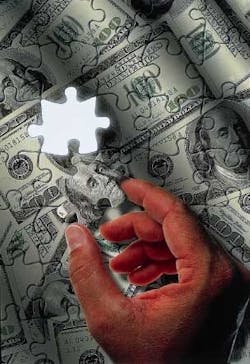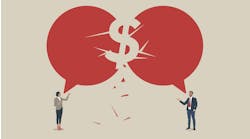by John A. Wilde, DDS
The average American dentist's income is near the apex of the earnings hierarchy of the wealthiest nation in the world's history. Yet, too few dentists - despite years of high earnings - ever achieve affluence. Many struggle with money matters throughout their careers. We constantly are confronted with the menacing statistic that only 5 percent of dentists can retire without any financial concerns. For hard-working, ethical, highly educated people, such limited financial rewards seem a travesty.
I'd like to employ some wisdom from the highly readable and inspirational best-selling book, Rich Dad, Poor Dad, by Robert Kiyosaki - enhanced by a few lessons of my own - in an effort to positively influence the depressing realities.
Kiyosaki is an entre preneur of considerable wealth and accomplishments. He retired at age 47, and developed an educational company dedicated to helping others achieve fiscal abundance. To date, his company has produced three books and three games designed to help teach sound investment precepts.
My credentials are somewhat less glossy. I worked my way through college and dental school, paying 100 percent of my expenses. After two years of military duty, I started an office from scratch in Keokuk, Iowa. I achieved financial freedom - i.e., becoming debt-free, with investment income exceeding my family of six's fiscal needs - after 12 years in practice.
At age 40, I added some associates and began to work part-time. Last year, I fully retired at age 53. Many people are much richer than I am, but I consider myself financially independent for life. I enjoy this kind of security because my investment income is sufficient enough that I should never have to touch my principal. (What the government doesn't get, my heirs can have fun squandering.)
Stumbling blocks
What keeps dentists and many other high-income earners from achieving prosperity? Kiyosaki claims that one of the impediments to wealth is being raised in a culture that focuses on spending, not saving. The siren song of advertising (purchase this product and you'll be loved and happy) has overwhelmed the older messages of delayed gratification and fiscal discipline. (Some examples of these "older" messages include: "A penny saved is a penny earned" or "Waste not, want not." The savings rate of Americans is among the world's lowest.
But low savings can be partially attributed to America's tax code. Kiyosaki - and many other fiscally astute folks - have stated that, since the Tax Reform Act of 1986, it is virtually impossible to become wealthy through earned income. Numerous dentists make a lot of money, but never seem to have any! Kiyosaki refers to many people's current financial situation - even in the midst of our booming economy - as living in a perpetual "rat race," delineated by three primary situations.
1. Most people work for someone else and they increase their employer's wealth, not their own. This is not as significant a problem in the still relatively independent world of dentistry as it is in medicine and other fields. But, third-party plans already have schooled us in how achieving wealth for others through our own sacrifices feels. This experience should provide lesson enough to vigilant dentists.
2. Taxes - federal, state, local, property, Social Security, Medicare, sales, etc. - confiscate your wealth.
3. Debt repayment - no longer an allowable tax deduction for most people since the 1986 Tax Reform Act - also drains financial resources.
Due to these factors, prosperity eludes many dentists, despite our elevated earnings potential and many other attainments. We remain one skill short of wealth. That key ability is financial literacy. You must understand the workings and language of wealth to achieve it, just as you must master the vocabulary of dentistry to achieve success in our profession.
Kiyosaki states, "The rich don't work for money; money works for them." (This reminds me of one of my favorite quotes by P. T. Barnum: "Money is a terrible master, but an excellent servant.") Kiyosaki also states that the letters JOB really are an acronym for "Just Over Broke."
While earned income is highly taxed, portfolio income (stocks, bonds, etc.) and passive income (real estate, royalties, etc.) can be structured to accumulate tax- deferred at a greatly accelerated rate. To have money work for you, you must learn to effectively convert earned income into passive or portfolio income. Establishing a flow of such tax-advantaged revenue is essential to achieving wealth.
Without financial wisdom - even if you attain riches - you are in danger of losing your wealth. Consider how often we hear about financial disasters befalling prosperous television and movie stars, professional athletes, rocks stars, and lottery winners. Even vast capital doesn't shelter these people from the consequences of fiscal ignorance or poor financial judgment.
To learn the language of finance, you must invest time and effort just as you would to learn any new skill. Techniques required to grasp the tools of wealth-building are similar to those required to master dentistry. Read books, such as Rich Dad, Poor Dad or The Millionaire Next Door. Attend lectures and listen to tapes on wealth accumulation. Develop mentoring relationships with those whose financial achievements you admire.
Once a minimal level of financial literacy has been realized, you are ready to begin achieving wealth. I've combined information from Rich Dad, Poor Dad with my own experience to identify four key areas of awareness and growth necessary to achieve monetary freedom.
Emotions - No matter the status of your financial skills, level of knowledge, or your work ethic, you must learn to be aware of and control the effect emotions have on investment decisions. Perhaps the most crippling emotion is fear because it can paralyze you into inactivity.
Kiyosaki states that he's never known a rich man who hasn't lost money, but that he's known many poor people who have never lost a cent. Winners aren't afraid to lose, he says, but losers are. By avoiding failure because of their uncertainty or fear, many people also avoid success. You must accept that some investment losses will occur, but the key is to learn from them and become smarter and stronger. Once you understand this concept, you can relax and enjoy investing.
Warren Buffet, world-famous investor known as "the oracle of Omaha," has said that "risk comes from not knowing what you are doing." Financial literacy and wisdom - the essential proficiencies of wealth achievement - provide at least a portion of the antidote to investment fear.
Another key emotion is laziness. (Discussing greed simply would take too long!) Without devoting time and effort, no one can learn successful investment techniques. Dentists generally are hard-working, but Kiyosaki claims that busy people often are the laziest. They are too busy to succeed! Not dedicating sufficient time to finances - even if it means sacrificing clinical hours - is a definite threat to dentists who might fall under this busy-lazy rubric.
Understand assets and liabilities - Kiyosaki's definition is succinct, and I believe it will surprise most people. He defines assets as possessions that put money in your pocket, while liabilities are entities that take money out. He says the wealthy buy assets, such as stock or real estate, while the poor purchase liabilities. It is imperative that you clearly understand his distinction between assets and liabilities.
For example, many would claim their homes, boats, cars, etc., to be assets. But, consider Kiyosaki's definition. Do any of the above en hance your income? Homes devour capital that goes out to pay mortgage, property taxes, insurance, maintenance, etc.
Of course, you need a place to live, but be honest and admit that your home is a fiscal liability because it reduces - not increases - assets. The larger the home, the greater the impediment to wealth. (My family still resides in the first home I bought less than a year after opening my office. I never liked being in debt. I completely paid off our home mortgage within three years.)
Pay yourself first - This is fairly common advice, although most people routinely ignore it and continue to save only after paying everyone else, thus achieving little or no capital to convert to an investment portfolio or passive income. Kiyosaki goes a step further than most with his advice in this area. He advocates that you pay yourself first, even if you are unable to pay your bills and taxes! When bill collectors and tax people come calling, he uses this short-term financial pressure as a stimulus to motivate him to develop ways to acquire additional capital. Corre spondence with the IRS always inspires me!
Kiyosaki notes that the poor often say, "I can't afford it." Such a statement, he says, shuts down creativity. On the other hand, the wealthy say, "How can I afford that?" Such a statement engages the wealthy person's creative self in a search to enhance revenue.
Understand the law and taxes as they relate to investing - Corporations - along with providing limited liability and other advantages - allow you to pay bills with pretax dollars. A variety of corporate structures - i.e., C corporations, S corporations, LLCs, LLPs - are clearly understood and widely employed by the wealthy.
For example, I own a small publishing company called The Novel Pen. Through this business entity, I pay my family's health insurance and reimburse my educational expenses - such as courses and tapes - with before-tax dollars. I also established a deductible home office and a 401(k) retirement plan through company. While not as effective as the C corporation I practiced under for 25 years, but it still allows for thousands of dollars in annual savings.
Many tax advantages are available to the financially literate, such as employing Section 1031 real-estate transfers that allow you to avoid paying taxes on real estate profits if a similar, more expensive, property is purchased. Self-education and employing excellent tax advisers are both required to take full advantage of complex tax and legal issues.
If you desire wealth, how should you react to the information you have received in this article? My advise is to read Rich Dad, Poor Dad. My own response to reading it - and then rereading it while taking notes - was to purchase five more copies for my children. My youngest, 17-year-old Rachel, was the first to finish the book. I was very amused to overhear her explaining to her 29-year-old lawyer/brother why his home and cars were liabilities!
I also bought the author's other two books and ordered one of his financial games for our entire family to play. These games are a fairly painless way to learn solid investment principles while having fun.
Financial freedom offers choices, such as going to the office or going to Hawaii! Doing my best with every dental procedure was anxiety-provoking and fatiguing. I feel any dentist who functions at the maximum of his or her abilities deserves exceptional financial rewards. The ideas we've considered - coupled with taking advantage of the resources Kiyosaki has created - can help you convert income into opulence, thus achieving the level of fiscal success that you deserve and desire.
Four keys to achieving wealth
- Controlling emotions - Winners aren't afraid to lose, but losers are. Successful investors understand that fiscal mishaps make them stronger and smarter. They courageously invest, accepting occasional losses as part of the wealth process.
- Understand assets and liabilities - Assets put money in your pockets; liabilities take money out. The rich buy assets; the poor buy liabilities. Homes, cars, and boats are all liabilities, because they require an outflow of capital to maintain them.
- Pay yourself first - Saving is how you convert earned income into revenue-producing assets. Save before paying taxes and bills, even when money is short. Use pressure from tax and bill collectors to stimulate efforts to enhance revenue.
- Master investment and tax law -The wealthy invest through corporations, maximizing their abilities to pay bills with before-tax dollars and taking complete advantage of tax-saving strategies such as Section 1031 real-estate transfers.







